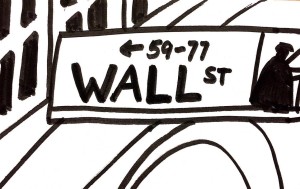1/17/16 Democratic Presidential Debate
With a platform largely based on reining in Wall Street, Bernie Sanders brought the issue of regulating banking giants into the January 17th Democratic presidential debate. In contrast to Hillary Clinton, who is financed by firms Citigroup Inc, Goldman Sachs, JPMorgan Chase & Co, and Morgan Stanley; Bernie Sanders supports breaking up the big banks and closing tax loopholes to make them pay their “fair share.” The Glass-Steagall Act was repealed under Bill Clinton in 1999. Bernie Sanders supports a modern day reinstatement of the Glass-Steagall Act whose absence is frequently cited as a major cause of the 2008 financial crisis.
What is the Problem?
The 2008 financial crisis was the burst of a credit bubble. Banks were granting loans to borrowers without adequate background checks or guarantee of return. However, when the housing market collapsed, banks like Lehman Brothers were brought to their knees. Because the failure of banks like Lehman Brothers would pose enormous risk to the American economy, banks considered “too big to fail” were bailed out by the U.S. Government. Is it fair that American citizens are providing the safety net for banks to engage in speculative behavior? No. According to Sanders, no single institution should have the power to singlehandedly crash the American economy, especially one leeching on the support of American taxpayers.
A Timeline of Events, Curated from Forbes
- 1933- The Glass-Steagall Act was enacted to distinguish commercial and investment banking.
- 1982- Congress passed the Garn- St.Germaine Depository Institution Act to deregulate the Savings and Loan industry. (deregulation led to speculative behavior costing taxpayers $201 billion and eliminated bank net-worth, accounting standards, and loan to value ratio requirements)
- 1999- Under the presidency of Bill Clinton, the Glass-Steagall Act was repealed.
- 2000- The Commodity Futures Modernization Act was signed into law, prohibiting regulation of Derivatives and enabling the “Enron loophole”.
- 2007- The crash of 2007, also known as The Great Recession.
As the debate rolled on, Hillary Clinton shrewdly maneuvered the discussion to the Dodd-Frank Act. Praising Obama, Clinton regurgitates the functions of Dodd-Frank, gloating that it gave the government regulatory power to rein in Wall Street. “We should know what’s in the Dodd-Frank, and what’s in Dodd-Frank already gives the president the authority (…)”, yet according to Bernie Sander’s Huffington Post article, “three out of the four financial institutions in this country (JP Morgan Chase, Bank of America, and Wells Fargo) are 80 percent larger today than they were on September 30, 2007, a year before the taxpayers of this country bailed them out. 80 percent!” If Dodd-Frank is so effective, why do banks continue to grow?
A Background of the Dodd-Frank
In 2010, the Obama administration passed the Dodd-Frank Wall Street Reform and Consumer Protection Act to prevent another financial crisis. Changes include:
- New agencies like the Financial Stability Oversight Council and Orderly Liquidation Authority were established to monitor the behavior of companies considered “too big to fail.”
- The Council has the power to break up big banks, and the Orderly Liquidation Fund can liquidate companies that are too financially weak.
- Insurance companies that pose risks can also be monitored by the Federal Insurance Office.
- The Consumer Financial Protection Bureau (CFPB) prevents speculative mortgage lending, and requires loan terms of credit card companie be presented in an understandable way.
- The Volcker Rule restricts trading in derivatives.
The Financial Stability Oversight Council and Orderly Liquidation Authority gives our government the authority to bust banks deemed too big to fail and can force banks to increase minimum reserves. Despite being granted these wide-ranging powers once covered by Glass-Steagall, however, the Financial Stability Oversight Council and Orderly Liquidation Authority have never taken action to reduce the sizes of prominent banks. As O’Malley nicely regarded, “And we have never used [the Dodd-Frank].”
How Effective is the Dodd-Frank Act?
Positive changes include authority of the CFPB to regulate the banking industry and requirement of lenders to evaluate borrower’s ability repay. However, the Dodd-Frank Act is still very limited. Risky features including adjustable interest rates and negative amortization are still possible, and the CFPB remains a vulnerable agency without clear leadership that is dependent on funding by the Federal Reserve. The Dodd-Frank Act is a step in the right direction, but it is not enough. Unfortunately, without the support of Republicans, countering the speculative Wall Street giants will be a very difficult task.
